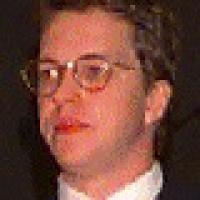
Nigel Short
Nigel David Short MBE (born 1 June 1965 in Leigh, Lancashire) is often regarded as the strongest English chess player of the 20th century. He became a Grandmaster at age 19. He challenged for the World Chess Championship against Garry Kasparov at London 1993. Still active, Short continues to enjoy international success. He is also a chess columnist, coach and commentator.
A chess prodigy, Short first attracted significant media attention, as a 10-year-old, by defeating Viktor Korchnoi in a simultaneous exhibition. In 1977 he became the youngest ever participant in the British Chess Championship by qualifying three days before his twelfth birthday. Two years later, at the British Championship in Chester 1979, the 14-year-old tied for first place with John Nunn and Robert Bellin, earning his first IM norm. He became (at the time) the youngest International Master in chess history, by scoring 8/15 in the Hastings Premier in 1979/80 and thus breaking Bobby Fischer's record of 1958. Participating in four World Junior Championships (1980–1983), Short achieved his best result during his first attempt in which he placed second to Garry Kasparov in 1980 at Dortmund. He was awarded the grandmaster title in 1984, aged nineteen—becoming the youngest grandmaster in the world at that time.
Short's assaults on the World Chess Championship title began in earnest in 1985 when he narrowly qualified from the Biel Interzonal to become Britain's first-ever candidate. He needed a playoff to advance past John van der Wiel and Eugenio Torre for the last berth, after the three had tied in regulation play. The Montpellier Candidates Tournament brought Short little success, however, as he scored 7/15 to finish in tenth place. In the next cycle, he again qualified by winning the 1987 Subotica Interzonal with Jon Speelman. The Candidates stage had by this time reverted to its traditional match format: Short defeated Gyula Sax (+2=3) in Saint John, Canada, in 1988, but then unexpectedly lost (−2=3) to his countryman, Jon Speelman, in London.
His next attempt was to prove his most successful. A last round victory over Mikhail Gurevich enabled Short to finish equal third with Vishwanathan Anand, behind Vassily Ivanchuk and Boris Gelfand, at the Manila Interzonal, thus qualifying as a Candidate for the third successive time. Defeating Gelfand (+4=2–2) in the 8/Final, he progressed to meet his former nemesis, Jon Speelman, in the quarters. This oscillating struggle went into extra-time in which the younger man eventually prevailed. In the semi-final, in 1992, the Englishman overcame the legendary Russian Anatoly Karpov (+4=4–2) in a match that was described as "the end of an era." In the final, in San Lorenzo de El Escorial, Short defeated Dutchman Jan Timman (+5=5–3) to earn the right to meet defending World Champion Garry Kasparov.
According to Short and Kasparov, the head of the chess world's governing body FIDE, Florencio Campomanes, decided on the venue of the match (Manchester) and the prize fund without consulting them, in breach of FIDE rules. The British WIM and author Cathy Forbes, in her book Nigel Short: Quest for the Crown (Cadogan 1993), wrote that at no time in the 1993 bidding process was a conforming World Championship match bid actually received by FIDE. In response, Short and Kasparov promptly formed a rival organisation, the Professional Chess Association. The resulting match—sponsored by The Times newspaper—was held under the auspices of the new body in London, from September to October 1993. Kasparov won convincingly (+6−1=13)- the largest margin of victory in a world title contest since Botvinnik defeated Tal in 1961.
Short won the British Chess Championship in 1984, 1987, and 1998, and the English Championship in 1991. He was the Commonwealth Champion in 2004, 2006 (both Mumbai) and 2008 (Nagpur). He won the 2006 EU Individual Open Chess Championship in Liverpool and took a share of second place in the 2008 edition, when it was held there again. He has finished outright first, or tied for first, in dozens of other international. Arguably Short's finest performance came at the Amsterdam VSB tournament in 1991 when he tied for first place with Valery Salov ahead of both Kasparov and Karpov.
Short's highest world ranking (third) was attained during January 1988 – July 1989. He reached his numerical peak Elo rating of 2712 in April 2004.
